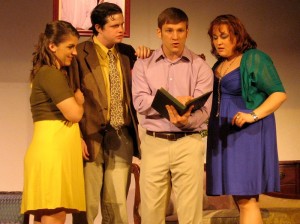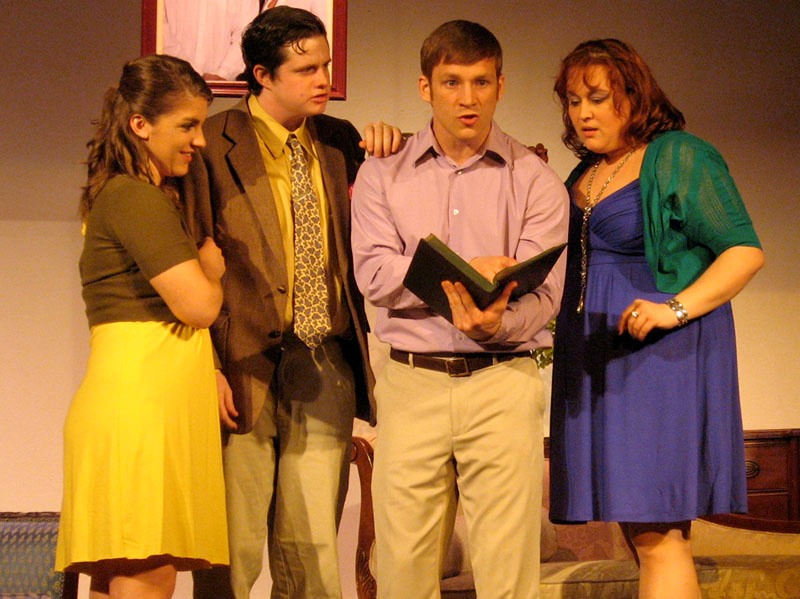
The Drama Group's production of THE IMPORTANCE OF BEING EARNEST by Oscar Wilde, directed by Angela Anderson, features (left to right) Lauren Myers as Cecily, Kevin Fennell as Algernon, Jesse Lehman as Jack and Crystal Why as Gwendolen.
“Really, if the lower orders don’t set us a good example, what on earth is the use of them.”
Ahhh, THE IMPORTANCE…Oscar Wilde’s brilliant send-up of Victorian society. Aptly subtitled “A Trivial Comedy for Serious People,” Wilde’s play was first performed on Valentine’s Day in 1895—and it has graced world stages ever since. It is a personal favorite of mine, and I had the pleasure of playing Lady Bracknell a few seasons back.
“To lose one parent, Mr. Worthing, may be regarded as a misfortune. To lose both seems like carelessness.”
After the success of Wilde’s plays “Lady Windermere’s Fan” and “A Woman of No Importance,” Wilde’s producers urged him to write further plays. In July 1894 he mooted his idea for THE IMPORTANCE OF BEING EARNEST to Sir George Alexander, the actor-manager of the St. James’s Theatre. Many names and ideas in the play were borrowed from people or places the author had known. Wilde summered with his wife and children at Worthing, so the locale provides the surname of his erstwhile hero, Jack. And Lady Queensberry, mother of his lover Lord Alfred Douglas, lived at Bracknell—giving name to the play’s antagonist. Wilde wrote the play quickly in August of 1894, while vacationing in the aforementioned Worthing. His fame now at its peak, he used the working title “Lady Lancing” to avoid pre-emptive speculation of its content. Extensive and meticulous revisions continued throughout the autumn—so much so that practically none of the original lines were left; what emerged is one of the greatest comedies in the English language, filled with brilliant comedic observations and bon mots. Literary critic Richard Ellmann argues that Wilde had reached his artistic maturity and wrote this work more surely and rapidly than any of his previous works.
“To be born, or at any rate bred in a handbag, whether it has handles or not, seems to me to display a contempt for the ordinary decencies of family life…”
During rehearsals for the original production, Alexander asked Wilde to shorten the play from its initial four acts to three. Wilde agreed and combined elements of the second and third acts. The largest cut was the removal of the character of Mr. Gribsby, a solicitor who comes from London to arrest the profligate “Ernest” (i.e., Jack) for his unpaid dining bills. Algernon, who is posing as “Ernest”, will be led away to Holloway Jail unless he settles his accounts immediately. Jack finally agrees to pay for Ernest, everyone thinking that it is Algernon’s bill when in fact it is his own. This version only has one noted performance—on the BBC radio, although it has occasionally turned up over the decades.
“Relations are simply a tedious pack of people, who haven’t got the remotest knowledge of how to live, nor the smallest instinct about when to die.”
Germantown’s The Drama Group’s production features a relatively young cast. Jesse Lehman is Jack “Earnest” Worthing. He and cohort Kevin Fennell, as Algernon Moncrieff, bounce off of each other quite well. They keep the pace brisk and have credible British accents. The distaff roles of Gwendolyn Fairfax and Cecily Cardew are played by Crystal Way and Lauren Myers respectively. The young lovers are joined by Dante Zappala as Rev. Chasuble, Andrew Deitch as the butlers Lane and Merriman, Colleen Bracken as Miss Prism and Stacy Skinner as Lady Bracknell. Lighting design was created by Wayne Snover and Kim Pelle; David Wise, Sandy Clay Bauer and Mr. Pelle provided a clever soundscape.
“We live, I regret to say, in an age of surfaces”
THE IMPORTANCE is above all else a comedy of manners. Wilde is skewering the Victorian class system and the arbitrary societal rules that governed everyone’s lives at the time. First-time Director Angela Anderson, for reasons not clear to my companion and I, has chosen to set the play in the present. Okay, I can adjust—you’re trying to make it relevant to younger contemporary audiences, perhaps. BUT—it still needs to be played with that 19th Century attitude—and the dry British wit. Ms. Anderson’s approach is more screwball comedy [a la “Bringing Up Baby”], which I felt went against the author’s intent. I am not one of those purists—I have thoroughly enjoyed many unusual approaches to Shakespeare, including productions done in contemporary dress. However, the common denominator in all of those was honoring the author’s underlying message.
“I do not approve of anything that tampers with natural ignorance. Ignorance is like a delicate exotic fruit; touch it and the bloom is gone.
I applaud the effort of this company, but there were a number of things that just didn’t work for me. Wilde has provided the ensemble with some of the best comedic lines ever written, and yet there was no appreciation of the language, no playing with the words. And there were major “traffic” problems. [I know as a new director, I made many similar mistakes.] There was too much movement—and much of it unmotivated, as well as lots of upstaging. There was also a lot of what a lighting designer I met once referred to as “opera gravity.” Anytime someone had a long speech they immediately went to downstage center. It gets very distracting when that’s done; it undermines any realistic interaction between characters.
“I could deny it if I liked. I could deny anything if I liked.”
The latter part of the Third Act did have some moments of hitting the right notes. The company should work towards more of that drollness. I also must give kudos to their handling of an unfortunate mishap with a table on the set during Act One opening night. They didn’t let it throw them and the actor playing Lane just calmly came onstage and cleared it away at an appropriate time. Hopefully my observations will be taken in the spirit in which they are given—constructively. I tried very hard to listen to others when I was a neophyte director so I could learn and improve.
“The truth is rarely pure and never simple. Modern life would be very tedious if it were either, and modern literature a complete impossibility!”
But please go see this production. The audience on opening night was enjoying themselves, so there’s something to be said there. And The Drama Group is a very brave company, not afraid to take risks. My hat is off to them for that. I’m dying to hear other people’s takes on the Group’s version of this wonderful classic—I love a good conversation about theatre. And “one should always have something sensational to read on the train.”
THE IMPORTANCE OF BEING EARNEST
By Oscar Wilde
Directed by Angela Anderson
Fridays & Saturdays @ 8pm
March 16-31, 2012
The Drama Group
First United Methodist Church of Germantown
6001 Germantown Avenue
Philadelphia, Pa 19144
215-844-0724
www.thedramagroup.org



4 comments
Correction: the Ms. Pelle mentioned in the review is really Mr. Pelle.
Thanks for the notification. We apologize and have made the correction.
Thank you Ellen for a thoughtful and helpful review. We very much appreciate it and hope to keep seeing you at The Drama Group!
Sincerely,
Miss Prism 🙂
Robert–thank you for the clarification. And my apologies to Mr. Pelle.
Colleen–thank you for taking my humble opinion in the spirit in which it was given. Hope the rest of the run goes well–and the table recovers.